Five Books to Add to Your Reading List This Black History Month
Posted on 29/10/2021
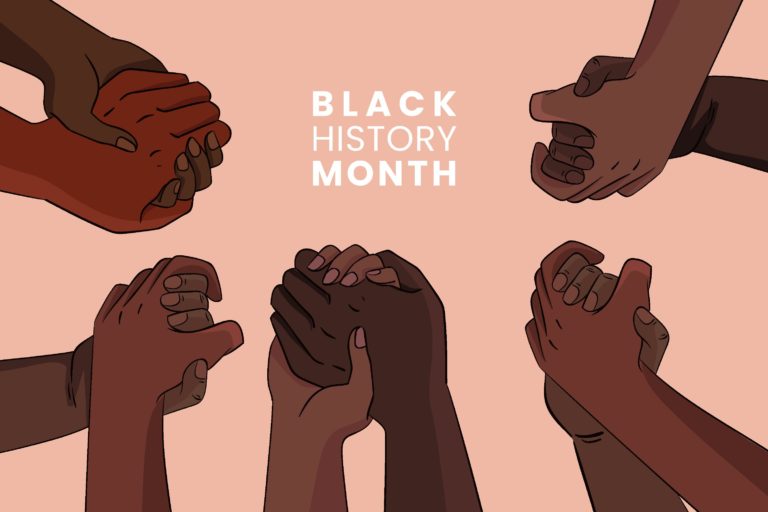
First marked in the UK in October 1987, Black History Month aims to promote and celebrate Black contributions to British society and to reflect on the diverse histories of those of African and Caribbean descent. It goes without saying that we should be reading books by Black authors all year round, however, we’d like to take this opportunity to highlight five powerful books by our authors, ranging from a searing work of climate activism to a ground-breaking study on diversity in education today, spanning modern classics to highly-anticipated debuts.
A Bigger Picture: My Fi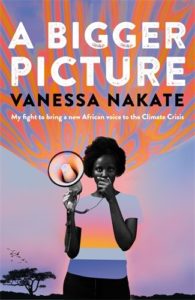 ght to Bring a New African Voice to the Climate Crisis, Vanessa Nakate
ght to Bring a New African Voice to the Climate Crisis, Vanessa Nakate
In A Bigger Picture, Vanessa Nakate exposes the shortcomings of our global discussions around climate change, which consistently envisage the environmental crisis as a problem for future generations. Such an image is only possible through the erasure of the voices of people living in the Global South, where environmental disasters are already having a devastating impact on communities, and especially on women. Despite this, people from the Global South – and people of colour from across the world – are often expunged from the picture of climate activism, as typified by Vanessa’s own erasure from a press photograph at Davos in 2020. As she explains, ‘we are on the front line, but we are not on the front page.’ Witnessing the destructive effects of global warming in her own community propelled Vanessa to become the first climate striker in Uganda at just twenty-one years old, despite risks to her personal safety. Buy a copy here.
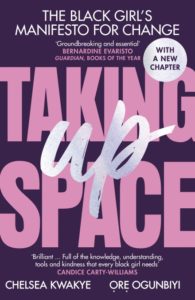 Taking Up Space: The Black Girl’s Manifesto for Change, Chelsea Kwakye and Ore Ogunbiyi
Taking Up Space: The Black Girl’s Manifesto for Change, Chelsea Kwakye and Ore Ogunbiyi
A groundbreaking exploration of the problems of diversity in education, by two extremely talented young graduates. As a minority in a predominantly white institution, taking up space is an act of resistance. And in higher education, feeling like you constantly have to justify your existence within institutions that weren’t made for you is an ongoing struggle for many people. Chelsea Kwakye and Ore Ogunbiyi, two recent Cambridge graduates, wrote Taking Up Space as a guide and a manifesto for change: tackling issues of access, unrepresentative curricula, discrimination in the classroom, the problems of activism, and life before and after university. Featuring honest conversations with students past and present, Taking Up Space goes beyond the buzzwords of diversity and inclusion and explores what those words truly mean for young black girls today. Buy a copy here.
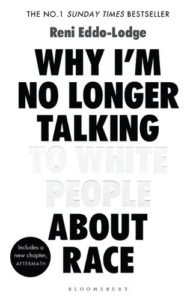 Why I’m No Longer Talking to White People About Race, Reni Eddo-Lodge
Why I’m No Longer Talking to White People About Race, Reni Eddo-Lodge
In 2014, award-winning journalist Reni Eddo-Lodge wrote about her frustration with the way that discussions of race and racism in Britain were being led by those who weren’t affected by it. She posted a piece on her blog, entitled: ‘Why I’m No Longer Talking to White People About Race’. Her words hit a nerve. The post went viral and comments flooded in from others desperate to speak up about their own experiences. Galvanised by this clear hunger for open discussion, she decided to dig into the source of these feelings. Exploring issues from eradicated black history to the political purpose of white dominance, whitewashed feminism to the inextricable link between class and race, Reni Eddo-Lodge offers a timely and essential new framework for how to see, acknowledge and counter racism. This searing and illuminating exploration of what it is to be a person of colour in Britain today spent more than 52 weeks in the Sunday Times Bestseller list and was the first book by a Black British author to top the overall UK charts. Buy a copy here.
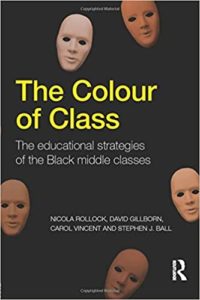 The Colour of Class: The Educational Strategies of the Black Middle Classes, co-authored by Nicola Rollock
The Colour of Class: The Educational Strategies of the Black Middle Classes, co-authored by Nicola Rollock
There is now an extensive body of research on the educational strategies of the white middle classes but a silence exists around the emergence of the Black middle classes and their experiences, priorities, and actions in relation to education. This book focuses on middle-class families of Black Caribbean heritage. Drawing on rich qualitative data from nearly 80 in-depth interviews with Black Caribbean middle-class parents, the internationally renowned contributors reveal how these parents attempt to navigate their children successfully through the school system, and defend them against low expectations and other manifestations of discrimination. The book sheds light on the complex, and relatively neglected relations between race, social class and education, and in addition, poses wider questions about the experiences of social mobility, and the intersection of race and class in forming the identity of the parents and their children. Buy a copy here. Nicola Rollock’s first solo book for the trade, The Racial Code, will be published by Allen Lane in 2022.
Look Out For…
 When Will We Be Free?, Simukai Chigudu
When Will We Be Free?, Simukai Chigudu
When Will We Be Free will be published in 2024 by The Bodley Head. Simukai Chigudu’s literary memoir interweaves his family’s and his own story with the history of Africa’s anti-colonial struggles from the 1950s to the present. It provides an intimate and nuanced account of colonisation not merely as a historical or political phenomenon but as something that inescapably affects one’s heart and mind – and an investigation of what it would mean to be truly free of it.
Born in 1986 in Harare, Chigudu was raised there during the early years of Zimbabwe’s independence but moved to Britain as a teenager during the violent political reckoning with colonial history that marked Mugabe’s presidency and abetted the country’s economic implosion. Almost 30 years later when he arrived at Oxford University, he was in the shadow of Cecil Rhodes, founder of the Rhodesian state once more. Chigudu is associate professor of African Politics at the university and one of the founding members of Rhodes Must Fall, which aims to decolonise Oxford as an institution and remove the statue of Rhodes at Oriel College. Read more about the book here.